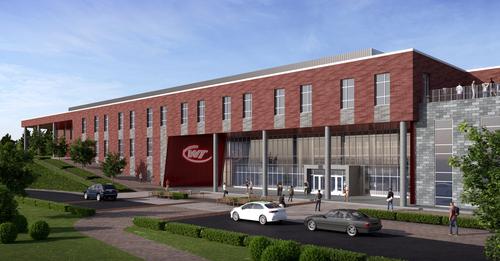REGIONAL – Town leaders across the North Shore can only hope a blizzard hits Haverhill but not any of the coastal towns on Jan. 23, keeping Haverhill’s residents from voting in the multi-town election to approve a nearly half-billion-dollar new building for the Whittier Regional Vocational Technical High School.
The Whittier Tech school committee voted 11-3 last week to hold a special election in a month for the 11 cities and towns in the district to decide if they will fund the building.
The vote followed the decision by the Massachusetts School Building Authority (MSBA) to reduce the amount it was expected to contribute to the building construction from $181 million to $157 million. Whittier hopes to make up some of the gap in state funding with grants.
The Whittier district towns and cities would have to pay more than $280 million, not counting interest on bonds over 30 years. Whittier Supt. Maureen Lynch said the average taxpayer would pay about $239 a year more for the next 30 years, if the building is approved.
The district has 120 days to approve the building or risk losing the MSBA money.
In recent weeks, Lynch has made the rounds of the towns and cities, showing them the need to replace the 50-year-old building at 115 Amesbury Line Rd in Haverhill.
“We have to do something,” Lynch told town leaders at a recent meeting.
The building is no longer equipped to provide a 21st century technical education and has pressing problems including a lack of sprinklers, accessibility issues, poor lighting in some spaces, no loading access for shops and a shortage of classroom space, she said. The school has also experienced sewage backups, and the Wi-Fi does not work well, according to Lynch.
The reaction from municipal officials from Salisbury to Ipswich has been outrage and vows to fight the funding for the new building.
Complaints are primarily about the proposed cost and the impact the new building will have on school and municipal operating budgets. Officials have focused their anger on what they believe was a failure by Whittier to inform its towns and cities about the building’s cost.
They also object to having a district-wide vote instead of each town voting separately.
Salisbury Selectman Michael Colburn said in the year and a half he has been on the SelectBoard, he has heard nothing until recently about Whittier needing a new building.
Newburyport Mayor Sean Reardon has complained repeatedly about the lack of communication and collaboration from Whittier.
Both the Ipswich SelectBoard and School Committee have asked Whittier to delay the vote. Whittier School Committee member Donna Holaday proposed postponing the vote until April, but lost 10-2.
The Whittier school committee is made up of representatives from each of the towns.
Being held in January on a one-issue ballot, the election is likely to draw a low voter turnout. In addition, early voting will not be allowed for this election.
The election could be dominated by Haverhill, which has more than 67,000 residents and has the support of the city’s officials. The total population of the 10 other cities and towns in the district is 93,446.
Haverhill sends 866 students to Whittier, the largest number of students from any town. Its students make up 68 percent of Whittier’s student population.
The Rowley SelectBoard campaigned to persuade other municipal leaders in the district to lobby the Whittier School Committee and state legislators not to allow this issue to be decided by a districtwide vote.
“Will you please join us in contacting the Whittier school committee and asking them to vote to have a town-by-town vote rather than a district-wide vote?” Rowley SelectBoard chairman Clifford Pierce wrote to the 10 other towns in the district.
Mayor Reardon agreed, writing to Whittier Board Chair Garry James and Lynch to ask that the municipalities be allowed to vote separately on authorizing a debt override to fund its share of the proposed building.
Newburyport would have a $30 million share of the building. It sends 29 students to Whittier.
“The draft ballot question does not have language stating that the vote is contingent on the passage of a debt exclusion override to Proposition 21/2,” Reardon wrote. “Newburyport voters may not understand that this vote would authorize the project moving forward without a plan for the City to pay for it.”
State law requires that voters approve any debt that is above its levy limit. It is called a debt-exclusion override.
For more information, visit buildingthefutureofwhittier.org.
Whittier Building Vote Set for January
Tuesday December 19, 2023

A rendering of the proposed new Whittier Vocational Technical High School



